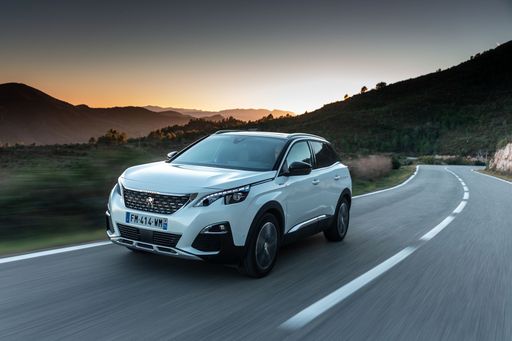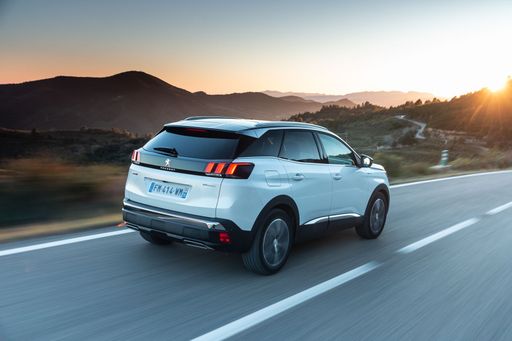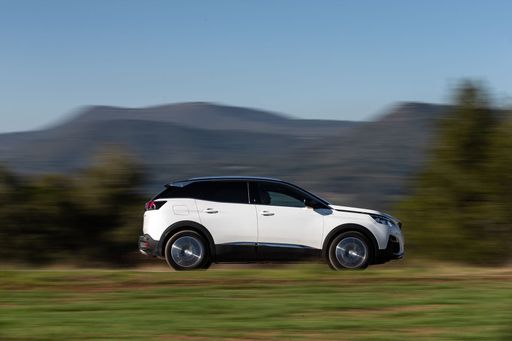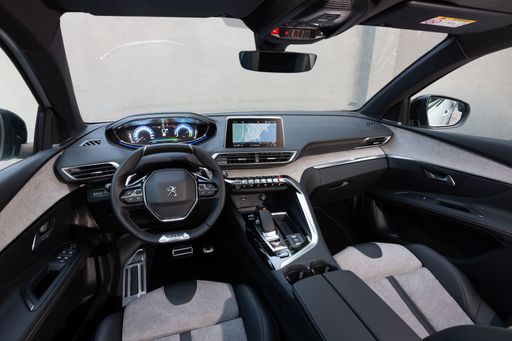Toyota Yaris vs Peugeot 3008 – Differences & prices compared
Compare performance, boot space, consumption and price in one view.
Find out now: which car is the better choice for you – Toyota Yaris or Peugeot 3008?
The Toyota Yaris (Hatchback) comes with a Full Hybrid or Petrol engine and Automatic or Manuel transmission. In comparison, the Peugeot 3008 (SUV) features a Plugin Hybrid, Electric or Petrol MHEV engine with Automatic transmission.
When it comes to boot capacity, the Toyota Yaris offers 286 L, while the Peugeot 3008 provides 520 L – depending on how much space you need. If you’re looking for more power, decide whether the 280 HP of the Toyota Yaris or the 325 HP of the Peugeot 3008 suits your needs better.
In terms of consumption, the values are 3.80 L per 100 km for the Toyota Yaris, and 16.80 kWh0.90 L for the Peugeot 3008.
Price-wise, the Toyota Yaris starts at 21900 £, while the Peugeot 3008 is available from 34400 £. Compare all the details and find out which model fits your lifestyle best!
Toyota Yaris
The Toyota Yaris exudes a charming blend of practicality and style, making it an appealing choice for urban drivers. Its compact design allows for easy manoeuvrability in crowded city streets, while the interior offers a surprisingly spacious and comfortable environment. With a focus on fuel efficiency and reliability, the Yaris remains a popular option for those seeking a balance between performance and economy.
details @ Toyota
@ Toyota
 @ Toyota
@ Toyota
Peugeot 3008
The Peugeot 3008 is a compact SUV that seamlessly combines sleek design with modern functionality. Its interior offers a sophisticated and comfortable driving experience, characterised by high-quality materials and innovative technology features. With its dynamic performance and stylish aesthetics, the 3008 stands out in the competitive world of family SUVs.
details @ media.stellantis.com
@ media.stellantis.com
 @ media.stellantis.com
@ media.stellantis.com
 @ media.stellantis.com
@ media.stellantis.com
 @ media.stellantis.com
@ media.stellantis.com

|

|
|
|
|
Costs and Consumption |
|
|---|---|
|
Price
21900 - 45000 £
|
Price
34400 - 51400 £
|
|
Consumption L/100km
3.8 - 9.5 L
|
Consumption L/100km
0.9 - 5.5 L
|
|
Consumption kWh/100km
-
|
Consumption kWh/100km
16.8 - 17.8 kWh
|
|
Electric Range
-
|
Electric Range
85 - 698 km
|
|
Battery Capacity
-
|
Battery Capacity
0.4 - 96.9 kWh
|
|
co2
87 - 215 g/km
|
co2
0 - 123 g/km
|
|
Fuel tank capacity
36 - 50 L
|
Fuel tank capacity
55 L
|
Dimensions and Body |
|
|---|---|
|
Body Type
Hatchback
|
Body Type
SUV
|
|
Seats
4 - 5
|
Seats
5
|
|
Doors
3 - 5
|
Doors
5
|
|
Curb weight
1090 - 1356 kg
|
Curb weight
1648 - 2337 kg
|
|
Trunk capacity
141 - 286 L
|
Trunk capacity
470 - 520 L
|
|
Length
3940 - 3995 mm
|
Length
4542 mm
|
|
Width
1745 - 1805 mm
|
Width
1895 mm
|
|
Height
1455 - 1500 mm
|
Height
1641 mm
|
|
Payload
289 - 525 kg
|
Payload
383 - 467 kg
|
Engine and Performance |
|
|---|---|
|
Engine Type
Full Hybrid, Petrol
|
Engine Type
Plugin Hybrid, Electric, Petrol MHEV
|
|
Transmission
Automatic, Manuel
|
Transmission
Automatic
|
|
Transmission Detail
Manual Gearbox, Automatic Gearbox, CVT
|
Transmission Detail
Dual-Clutch Automatic, Reduction Gearbox
|
|
Drive Type
Front-Wheel Drive, All-Wheel Drive
|
Drive Type
Front-Wheel Drive, All-Wheel Drive
|
|
Power HP
116 - 280 HP
|
Power HP
145 - 325 HP
|
|
Acceleration 0-100km/h
5.5 - 9.7 s
|
Acceleration 0-100km/h
6 - 10.2 s
|
|
Max Speed
175 - 230 km/h
|
Max Speed
170 - 220 km/h
|
|
Torque
390 Nm
|
Torque
230 - 511 Nm
|
|
Number of Cylinders
3
|
Number of Cylinders
3 - 4
|
|
Power kW
85 - 206 kW
|
Power kW
107 - 239 kW
|
|
Engine capacity
1490 - 1618 cm3
|
Engine capacity
1199 - 1598 cm3
|
General |
|
|---|---|
|
Model Year
2024 - 2025
|
Model Year
2024 - 2025
|
|
CO2 Efficiency Class
B, G
|
CO2 Efficiency Class
B, A, D
|
|
Brand
Toyota
|
Brand
Peugeot
|
Toyota Yaris
Introducing the Next-Gen Toyota Yaris: A Blend of Innovation and Technology
The Toyota Yaris has long been lauded for its efficiency, reliability, and practicality. As we venture into the 2024 model year, Toyota has upped the ante with the latest versions of this popular hatchback, melding cutting-edge technology with eco-conscious design. Here’s an in-depth look at what makes the current Yaris line-up stand out from the crowd.
Efficient Powertrains: Hybrid and Beyond
Spearheading the technological innovation in the Yaris range is the introduction of various hybrid models. The Yaris offers a 1.5-litre full-hybrid engine, marrying a petrol engine with an electric motor to produce between 116 and 130 PS. This power blend is controlled via a sophisticated CVT-gearbox, optimizing both performance and fuel efficiency, with consumption figures ranging from an impressive 3.8 to 4.2 litres per 100 km.
For those seeking pure performance, the GR Yaris variants provide a turbocharged 1.6-litre engine capable of producing 280 PS. This power is delivered via a choice of manual or automatic transmission, giving drivers the tactile involvement or convenience they desire.
Design that Fulfils and Inspires
The Yaris hasn't forgotten its roots as a compact, city-friendly hatchback, measuring between 3,940 and 3,995 mm in length. With its bold front grille, sleek lines, and a choice of striking colours, it's a car that turns heads while remaining perfectly suited for urban environments.
The interior is equally impressive, designed with a focus on driver convenience and comfort. Depending on the variant, Yaris can offer generous cargo space of up to 286 litres, making it a perfect companion for everyday tasks or weekend escapes.
Technological Integration: The Smart Choice
Toyota's approach goes beyond just improving engine technology; the Yaris is packed with innovative features aimed at enhancing the driving experience. It boasts a suite of advanced safety systems such as lane departure alert, pre-collision system, and adaptive cruise control, ensuring peace of mind on the road.
The infotainment system in the Yaris is designed to keep you connected, offering seamless smartphone integration, a user-friendly interface, and an intuitive navigation system, ensuring that you're always informed and entertained.
The Cost of Innovation
Owning a Yaris is not just about impressive technology; it's also about making economic sense. With a price range between €25,500 and €49,990, and monthly costs spanning from €748 to €1,513, it offers a broad spectrum to suit different budget needs.
Concerned about emissions? You can rest easy knowing that the Yaris boasts a CO2 efficiency class ranging from B to G, thanks to its low emissions output of between 87 to 215 g/km.
Conclusion: The Toyota Yaris Drives the Future
The Toyota Yaris continues to be a strong contender in the compact car segment, pushing boundaries with its innovative full-hybrid systems and performance-oriented GR models. It's a remarkable blend of design, technology, and economy, ensuring it remains a top choice for drivers who demand more from their hatchbacks.
Whether you're seeking the efficiency of a hybrid or the thrill of the GR Yaris, there's a model tailored to your unique driving needs in Toyota's latest Yaris lineup.
Peugeot 3008
Introduction to the Peugeot 3008
In the rapidly evolving world of SUVs, the Peugeot 3008 stands out as a prime example of innovative design and advanced technology. Offering a range of powertrains from hybrid to fully electric, the 3008 is tailored to meet the needs of eco-conscious drivers without sacrificing performance or luxury.
Powertrain Options and Performance
The Peugeot 3008 is designed to cater to a variety of driving preferences with its versatile range of powertrains. The options include petrol mild-hybrid, plug-in hybrid, and full electric variants. The power output ranges from a modest 136 PS to a robust 210 PS, providing a performance spectrum to suit both city commuters and long-distance travellers. Notably, the plug-in hybrid variant boasts an impressive electric range of up to 85 km, while the electric version can travel up to 524 km on a single charge, making it ideal for both urban and rural settings.
Driving Dynamics and Efficiency
The 3008's driving dynamics are refined and engaging, supported by its front-wheel-drive configuration and automatic transmission. Depending on the model, the vehicle can accelerate from 0 to 100 km/h in as little as 8.4 seconds, while maintaining an efficient fuel consumption rate of as low as 0.9 L/100km for the plug-in hybrid variant. For the eco-conscious drivers, the electric model offers a consumption rate of 17.7 kWh/100km, and its CO2 emissions range from 0 to 129 g/km, reflecting its commitment to reducing environmental impact.
Design and Comfort
The Peugeot 3008 boasts a modern and sophisticated design that embodies both elegance and functionality. Its expansive interior offers seating for five, complemented by a generous boot capacity of 520 litres. The vehicle's dimensions—4,542 mm in length, 1,895 mm in width, and 1,641 mm in height—ensure ample space and a commanding presence on the road. Additionally, the 3008's array of equipment lines like Allure and GT enhance the driving experience with premium features and luxurious touches.
Innovations and Technology
The Peugeot 3008 is equipped with a suite of cutting-edge technological features designed to enhance the driving experience. The intuitive infotainment system is central to the vehicle's interior, offering seamless connectivity and navigation options. Safety and driver assistance technologies are also prominent, including advanced systems for collision avoidance and parking assistance, ensuring peace of mind on every journey.
Conclusion
In summary, the Peugeot 3008 is a compelling choice for those seeking a versatile and modern SUV. With a range of efficient powertrains, dynamic performance, and luxurious design elements, it caters to a broad spectrum of drivers. Its advanced technological features and commitment to sustainability make the Peugeot 3008 a forward-thinking option in today's automotive landscape.
Which drive types are available for the Toyota Yaris?
Available as Front-Wheel Drive or All-Wheel Drive.
The prices and data displayed are estimates based on German list prices and may vary by country. This information is not legally binding.
